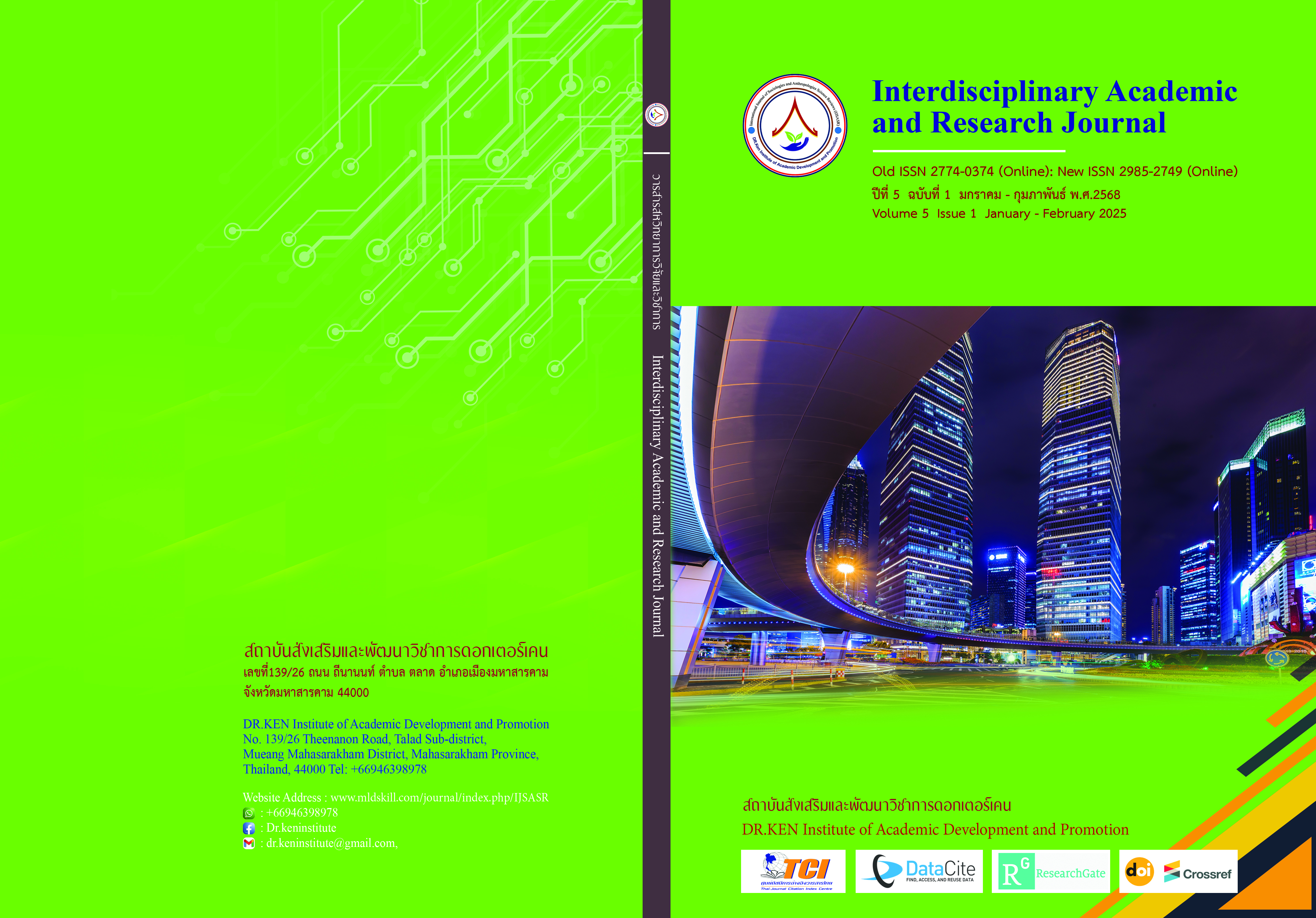Evaluation of Factors for Transportation Service Providers Selection Considering of Sustainability in Leamchabang Industrial Estate Chonburi Province
DOI:
https://doi.org/10.60027/iarj.2025.284914Keywords:
Sustainability, Selection of transport service providers, Industrial estate, Corporate Social Responsibility (CSR), Environmental managementAbstract
Background and Aims: Evaluating factors in selecting a transportation service provider in an industrial area is important to be able to appropriately meet customer needs in terms of cost, reliability, and sustainability, which will help improve operational efficiency and create a competitive advantage. This study aims to analyze and evaluate factors influencing the selection of transport service providers with a focus on sustainability within the Laem Chabang Industrial Estate, Chonburi Province.
Methodology: A mixed-method approach was employed, involving qualitative and quantitative analyses. The qualitative phase utilized the Analytical Hierarchy Process (AHP) and interviews, while the quantitative phase employed structured questionnaires. The sample consisted of 15 decision-makers across eight companies, including safety and environmental managers, transportation planning managers, transport company selection managers, hazardous goods inbound and outbound managers, and their respective supervisors.
Results: The findings reveal that the primary factors influencing transport service provider selection are categorized into three dimensions: 1) Economic Factors: Price (46.07%) and company reliability (19.60%). 2) Social Factors: Operational efficiency (13.60%), occupational health and safety (7.00%), and corporate social responsibility (CSR) (5.23%). Technology and Innovation Factors: GPS tracking transportation MGT system (TMS) and Warehouse MGT system (WMS) (4.5%)3) Environmental Factors: Environmental responsibility and management systems (4.00%). Among 22 sub-factors assessed, the top three with the highest weights were payment terms (36.96%), service price per trip (13.56%), and cargo insurance coverage (6.17%). Overall, economic factors held the highest importance (79.27%), followed by social factors (12.23%) Technology and Innovation (4.5%), and environmental factors (4.00%). Transport service providers should emphasize sustainable strategy development and operational planning to elevate service standards and align with sustainability principles.
Conclusion: The research results indicate that important factors in selecting a transportation service provider are divided into 4 main dimensions, with the economic dimension being the most important (79.27%), followed by the social, technological, and environmental dimensions, and strategies should be developed with sustainability in mind to improve service standards.
References
กาญจนา คลายใจ, วันเพ็ญ เจริญตระกูลปีต (2565). ปัจจัยที่ส่งผลต่อการตัดสินใจเลือกผู้ให้บริการในการขนส่งโลจิสติกส์ ของผู้ประกอบการธุรกิจอาหารแปรรูปทางการเกษตร ในเขตอำเภอสันทราย จังหวัดเชียงใหม่. วารสารสันติสุขปริทรรศน์. 3 (2), 13-22.
วรวุฒิ ไชยศร. (2560). ความรับผิดชอบต่อสังคมขององค์กรธุรกิจกับการพัฒนาที่ยั่งยืน: กรณีศึกษาความรับผิดชอบต่อสังคม 6 บริษัท. วารสารปัญญาภิวัฒน์, 9(3), 1-13.
ศราวุธ ไชยธงรัตน์ และณัฐพัชร อารีรัชกุลกานต์. (2564). การประยุกต์ใช้กระบวนการวิเคราะห์เชิงลำดับชั้นในการคัดเลือกผู้ขายอย่างยั่งยืนกรณีศึกษา บริษัทเอบีซี. วารสารวิทยาลัยโลจิสติกส์และซัพพลายเชน, 7(2), 6-17.
Ballou, R. H. (2007). Business Logistics/Supply Chain Management: Planning, Organizing, and Controlling the Supply Chain. Pearson Education.
Bowersox, D. J., Closs, D. J., & Cooper, M. B. (2013). Supply Chain Logistics Management. McGraw-Hill Education.
Christopher, M. (2016). Logistics and Supply Chain Management. Pearson Education.
Evangelista, P., Santoro, L., & Thomas, A. (2018). Environmental Sustainability In Third-Party Logistics Service Providers: A Systematic Literature Review From 2000–2016. Sustainability, 10(5), 1-34.
Hendiani, S., Liao, H., Ren, R., & Lev, B. (2020). A Likelihood-Based Multi-Criteria Sustainable Supplier Selection Approach with Complex Preference Information. Information Science, 536, 135-155.
Kraus, L. (2021). Sustainable Urban Transportation Criteria And Measurement—A Systematic Literature Review. Sustainability, 13(13), 1-21.
Kubde, R., & Bansod, S.V. (2012). The Analytic Hierarchy Process Based Supplier Selection Approach For Collaborative Planning Forecasting And Replenishment Systems. International Journal of Engineering Research & Technology, 1(7), 1-12.
Memari, A., Dargib, A., Jokara, M., Ahmadc, R. (2019). Sustainable Supplier Selection: A Multi-Criteria Intuitionistic Fuzzy TOPSIS Method. Journal Of Manufacturing Systems, 50(63). 9-24.
Mentzer, J. T. (2004). Fundamentals of Supply Chain Management: Twelve Drivers of Competitive Advantage. SAGE Publications.
Pishchulov, G., Trautrims, A., Chesney, T., Gold, S., & Schwab, L. (2019). The Voting Analytic Hierarchy Process Revisited: A Revised Method with Application to Sustainable Supplier Selection. International Journal of Production Economics, 211, 166-179.
Rushton, A., Croucher, P., & Baker, P. (2022). The Handbook of Logistics and Distribution Management. Kogan Page.
Yu, C., Shao, Y., Wang, K., & Zhang, L. (2019). A Group Decision Making Sustainable Supplier Selection Approach Using Extended TOPSIS Under Interval-Valued Pythagorean Fuzzy Environment. Expert Systems with Applications, 121, 1-17.
Downloads
Published
How to Cite
Issue
Section
License
Copyright (c) 2025 Interdisciplinary Academic and Research Journal

This work is licensed under a Creative Commons Attribution-NonCommercial-NoDerivatives 4.0 International License.
Copyright on any article in the Interdisciplinary Academic and Research Journal is retained by the author(s) under the under the Creative Commons Attribution-NonCommercial-NoDerivatives 4.0 International License. Permission to use text, content, images, etc. of publication. Any user to read, download, copy, distribute, print, search, or link to the full texts of articles, crawl them for indexing, pass them as data to software, or use them for any other lawful purpose. But do not use it for commercial use or with the intent to benefit any business.
















.png)


